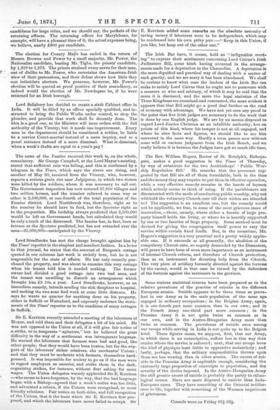The Rev. William Rogers, Rector of St. Botolph's, Bishops- gate,
makes a good suggestion in the Times of Thursday, by way of substitute for the two Archbishops' Public Wor- ship Regulation Bill.' He remarks that the processes sug- gested by that Bill are all of them formidable, both in the time and the money they may require to put them in effective operation, while a very effective remedy remains in the hands of laymen which nobody seems to think of using. If the parishioners are discontented with the mode of conducting public worship, why not withhold the voluntary Church-rate till their wishes are attended to? The suggestion is an excellent one, but the remedy would not be applicable, we fear, to some of the most grievous cases of innovation,—those, namely, where either a fanatic of large pro- perty himself holds the living, or where he is heartily supported by one or two fanatics of large property. Some method must be devised for giving the congregation itself power to vary the service within certain fixed limits. But, in the meantime, Mr. Rogers's suggestion is a very practical and a pretty widely applic- able one. If it succeeds at all generally, the abolition of the compulsory Church-rate, so eagerly demanded by the Dissenters, will prove to have been of even more importance as an instrument of internal Church reform, and therefore of Church protection, than as an instrument for diverting help from the Church. The very piece of artillery formerly directed against the fortress by the enemy, would in that case be turned by the defenders of the fortress against the mutineers in the garrison.


































 Previous page
Previous page